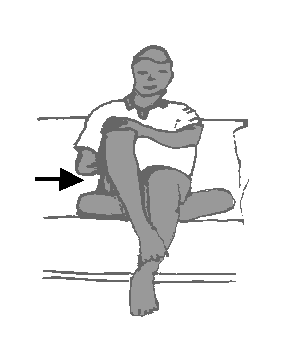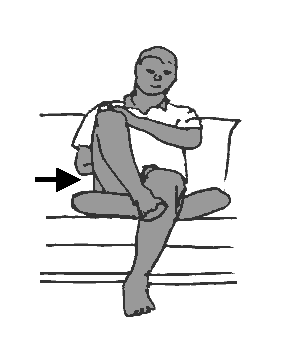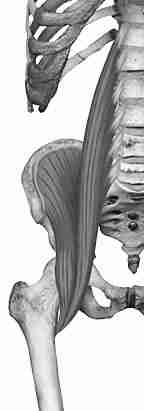|
|
|---|
The Itchy Shin:- Start Position
- Sit on a chair or comfortable seat with your back supported.
- Let your lumbar spine flex a little so that your pelvis is "looking upward".
- Place your right fingers just to the side of the hip crease so you can check that
the Tensor fascia lata (TFL) remains inactive (see arrow on diagram).
- Raise your right foot and place your right heal against your lower left shin.
- Scapulas anchored and head buoyant on top of your spine.
The Itchy Shin:- Action
(Keep checking with your right hand that the TFL stays inactive!)
- Breathe in and zip and hollow.
- (Breathing out): Raise your right heal to "scratch" along your left shin.
- Breathe in and maintain zip and hollow.
- (Breathing out): Lower your right heal to "scratch" your left shin in reverse.
- Repeat four to 10 times.
Comments
Option: You can make this exercise harder by pushing down with your left hand on your knee (see diagram).
(iliopsoas, tendonitis, bursitis, pilates exercise, Scroll right>>>...)
|
The Itchy Shin:
Start Position
(Arrow points out the TFL)

Action
(Arrow points out the TFL)

|
Pictures:
The Iliopsoas muscles

The Tensor Fascia lata

|
|
What it does
- Works the Iliopsoas muscle in preference to the Tensor fascia lata, thereby minimizing hip medial
rotation(1).
- The specific body positioning and Pilates style bracing protects the lumbar spine
from the compressive forces of the Iliopsoas muscle.
- A strong and active Iliopsoas aids in preventing forward glide of the femoral head
in the hip socket, which is the directional susceptibility of motion
associated with hip and groin pain due to iliopsoas tendonitis/ bursitis, and acetabular labral tears(1).
Watch Points
- The trick is to keep all other leg muscles relaxed. This is a skill rather than a strength exercise!
- Keep the upper body relaxed.
- Make sure that the hips do not twist to the side.
Reference
- Shirley A Sahrmann: Diagnosis and Treatment of Movement Impairment Syndromes;
Publ. Mosby 2002 ISBN 0-8016-7205-8
- Consequences of Office Chair Sitting(3): Tight Hamstrings,
Iliopsoas Trigger Points, Erector Spinae Muscle Fatigue.
iliopsoas, bursitis, tendonitis, labral tears, pilates exercise,
© Bruce Thomson, EasyVigour Project
scroll up^^^^.....
|



